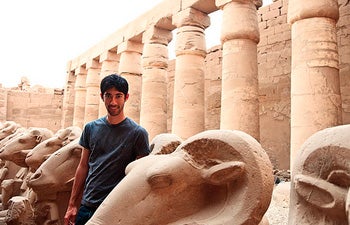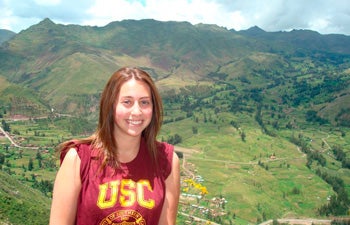Culturally Speaking
Arabic is the fastest-growing foreign language taught in universities and colleges across the country, according to the Modern Language Association.
Enrollment in Arabic classes grew 127 percent nationally from 2002 to 2006, by far the largest increase in all foreign languages taught in United States institutions of higher education. Four Arabic language classes are currently offered through the USC College Language Center, and enrollment has seen a steady increase in the past 12 years.
With the development of digital media, globalization and the rapid expansion of university study-abroad programs, 21st-century students have more opportunities to develop their linguistic abilities than any other time in history.
USC College undergraduates Amy Herrmann and Ken Sofer have taken advantage of these opportunities. Their hard work and dedication to learning Arabic have paid off.
In May, Herrmann and Sofer were awarded a U.S. State Department Critical Language Scholarships (CLS), enabling them to study Arabic overseas. Two additional USC students awarded the scholarship will study Japanese and Arabic. Since the program’s inception in 2006, nine USC students have been CLS recipients. The scholarships are made possible through the Council of American Overseas Research Centers and the American Councils for International Education.
The CLS program is dedicated to creating fluent language speakers in “critical need” languages such as Arabic, Chinese and Korean. The program provides students with a fully-funded trip to one of 15 overseas intensive summer language institutes for seven to ten weeks of daily language instruction in one of 13 foreign languages. Each student participates in various cultural enrichment activities and trips.

While studying abroad at the American University in Cairo, Ken Sofer visits the Luxor Temple on the east bank of the River Nile in Luxor, Egypt. Photo credit Daniel Sofer.
Sofer has already completed Arabic courses in the College, studied abroad at the American University in Cairo, worked in the U.S. Embassy in Cyprus and interned at the U.S. State Department in Washington, D.C. Studying a language in the country where it is spoken is important to fully understanding its impact and power, he said.
“Language is the doorway into understanding culture,” said Sofer, who in May earned his bachelor’s in international relations and political science. “If you don’t understand a language, I don’t think you can truly understand a culture.”
Arabic is spoken by more than 220 million people worldwide, and is the official language of 26 countries, mostly in the Middle East and North Africa. Modern Standard Arabic is the formal language across these areas and most printed materials use this form. However, daily interactions in specific regions often use some variety of Colloquial Arabic, and many of these dialects are spoken languages only.
“If you go around speaking Modern Standard Arabic, it’s similar to speaking Shakespearean English,” said Herrmann, who recently completed her sophomore year pursuing a major in international relations with minors in peace and conflict studies, and human rights. “It’s difficult to communicate unless you’re learning the local dialect of the area you’re in, which is why I think going abroad is the only way I could effectively learn Arabic.”

Amy Herrmann participated in USC’s Alternative Spring Break program in Cusco, Peru, where students refurbished a school then taught classes there. Photo courtesy of Amy Herrmann.
Many of the local dialects are vastly different from others, and some are mutually unintelligible. While both Sofer and Herrmann are attending the program to study Arabic, they will study in different countries and are learning the language for different reasons. In June, Sofer will travel to Amman, Jordan, to study the Levantine dialect at the American Center for Oriental Research.
“I’m very interested in either becoming a foreign service officer or working with U.S.-Middle East foreign policy,” said Sofer, the son of an Iraqi-Jewish father and a Japanese mother. “I’ve used the language not only for academic purposes and professional purposes, but to also reconnect with my family’s past.”
An experienced traveler, Herrmann knows the value of language when it comes to connecting with people. In high school, she spent time in Botswana in southern Africa and fell in love with the continent and its people. She knew she wanted to work in Africa rehabilitating women affected by violence and children forced to be soldiers, so she started learning the languages to maximize her ability to help.
“If I want to be successful in helping them at all, I need to be able to talk to them,” Herrmann said. She has also studied Spanish, French and Tsetswana.
In June, she will travel to Tangier, Morocco, and study the Moroccan dialect, Darija. Upon her return, she plans to spend a semester abroad studying Arabic in Egypt and later Swahili in South Africa.
“There are different reasons we study these languages,” Herrmann said. “For me, it’s from a humanitarian perspective.”
Other award recipients are junior Michael Scott of the USC Viterbi School of Engineering, who will study Arabic in Cairo, Egypt; and Ken Provencher, a doctoral candidate in cinema-television (critical studies) in the USC School of Cinematic Arts, who will study Japanese in Kyoto, Japan.